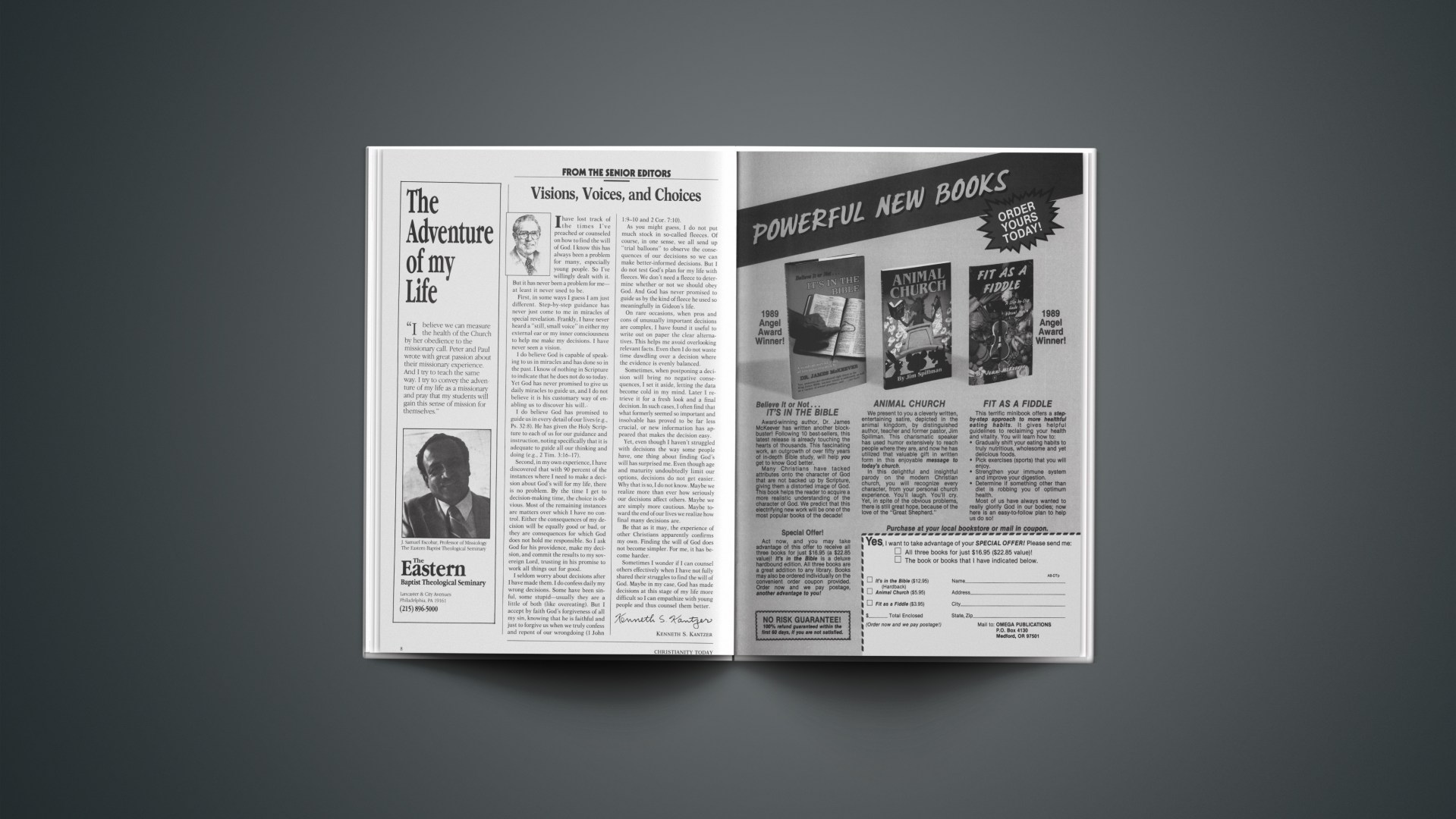I have lost track of the times I’ve preached or counseled on how to find the will of God. I know this has always been a problem for many, especially young people. So I’ve willingly dealt with it. But it has never been a problem for me—at least it never used to be.
First, in some ways I guess I am just different. Step-by-step guidance has never just come to me in miracles of special revelation. Frankly, I have never heard a “still, small voice” in either my external ear or my inner consciousness to help me make my decisions. I have never seen a vision.
I do believe God is capable of speaking to us in miracles and has done so in the past. I know of nothing in Scripture to indicate that he does not do so today. Yet God has never promised to give us daily miracles to guide us, and I do not believe it is his customary way of enabling us to discover his will.
I do believe God has promised to guide us in every detail of our lives (e.g., Ps. 32:8). He has given the Holy Scripture to each of us for our guidance and instruction, noting specifically that it is adequate to guide all our thinking and doing (e.g., 2 Tim. 3:16–17).
Second, in my own experience, I have discovered that with 90 percent of the instances where I need to make a decision about God’s will for my life, there is no problem. By the time I get to decision-making time, the choice is obvious. Most of the remaining instances are matters over which I have no control. Either the consequences of my decision will be equally good or bad, or they are consequences for which God does not hold me responsible. So I ask God for his providence, make my decision, and commit the results to my sovereign Lord, trusting in his promise to work all things out for good.
I seldom worry about decisions after I have made them. I do confess daily my wrong decisions. Some have been sinful, some stupid—usually they are a little of both (like overeating). But I accept by faith God’s forgiveness of all my sin, knowing that he is faithful and just to forgive us when we truly confess and repent of our wrongdoing (1 John 1:9–10 and 2 Cor. 7:10).
As you might guess, I do not put much stock in so-called fleeces. Of course, in one sense, we all send up “trial balloons” to observe the consequences of our decisions so we can make better-informed decisions. But I do not test God’s plan for my life with fleeces. We don’t need a fleece to determine whether or not we should obey God. And God has never promised to guide us by the kind of fleece he used so meaningfully in Gideon’s life.
On rare occasions, when pros and cons of unusually important decisions are complex, I have found it useful to write out on paper the clear alternatives. This helps me avoid overlooking relevant facts. Even then I do not waste time dawdling over a decision where the evidence is evenly balanced.
Sometimes, when postponing a decision will bring no negative consequences, I set it aside, letting the data become cold in my mind. Later I retrieve it for a fresh look and a final decision. In such cases, I often find that what formerly seemed so important and insolvable has proved to be far less crucial, or new information has appeared that makes the decision easy.
Yet, even though I haven’t struggled with decisions the way some people have, one thing about finding God’s will has surprised me. Even though age and maturity undoubtedly limit our options, decisions do not get easier. Why that is so, I do not know. Maybe we realize more than ever how seriously our decisions affect others. Maybe we are simply more cautious. Maybe toward the end of our lives we realize how final many decisions are.
Be that as it may, the experience of other Christians apparently confirms my own. Finding the will of God does not become simpler. For me, it has become harder.
Sometimes I wonder if I can counsel others effectively when I have not fully shared their struggles to find the will of God. Maybe in my case, God has made decisions at this stage of my life more difficult so I can empathize with young people and thus counsel them better.










